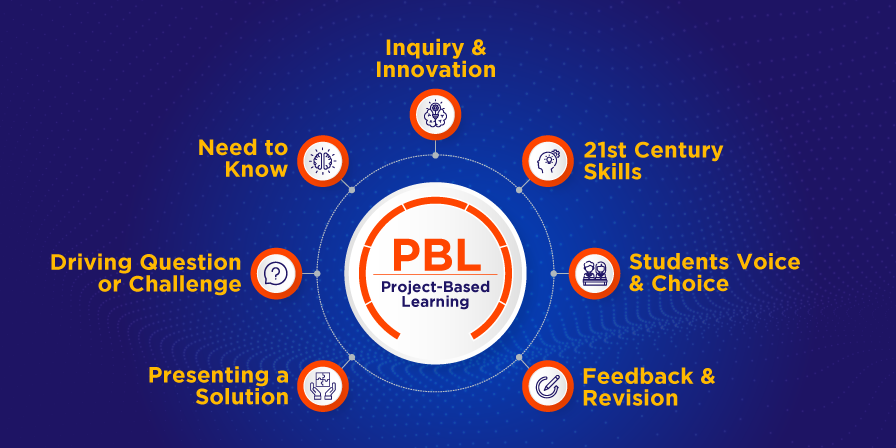![]()
Addressing these challenges with thoughtful strategies and robust teacher training can help ensure the successful implementation of Project-Based Learning, which aligns with the transformative goals of NEP 2020.
Common Challenges:
- Lack of Resources: Schools may need more resources, such as materials or technology, to support PBL activities effectively.
- Time Constraints: Implementing PBL can be time-consuming, requiring careful planning and a shift from traditional teaching methods, which may be challenging in already packed curriculums.
- Teacher Readiness: Not all educators are familiar with PBL, which can make it difficult to facilitate projects and guide students through the learning process.
LEAD Group’s Role in Implementing PBL
LEAD Group’s Curriculum Integration
LEAD’s curriculum is meticulously designed to incorporate Project-Based Learning (PBL) at every stage, ensuring students actively engage in hands-on, experiential learning. By embedding PBL into its core curriculum, LEAD Group allows students to apply their knowledge to real-world scenarios, fostering critical thinking and problem-solving skills. The curriculum is structured to align with NEP 2020, making it flexible and comprehensive, providing educators with a clear roadmap to integrate PBL seamlessly into their teaching practices.
Teacher Training and Professional Development
LEAD offers comprehensive teacher training programs that equip teachers with the skills and knowledge necessary to implement PBL in their classrooms effectively. These professional development initiatives include workshops, coaching sessions, and continuous support, ensuring that teachers are confident and capable of guiding students through PBL projects.
LEAD Group conducts in-person teacher training workshops four times a year, providing timely opportunities for teachers to receive hands-on training and address any queries they might have.
LEAD Group’s approach to teacher training emphasises the importance of reflective practice and collaboration, enabling teachers to share best practices and innovate their teaching strategies.
Digital and Technological Tools
LEAD Group’s digital platform is a powerful tool that supports PBL by providing educators and students with access to a wide range of resources, project management tools, and collaboration features. This platform facilitates seamless communication and organisation, making it easier to manage complex projects. Additionally, LEAD Group’s smart classroom solutions, equipped with interactive technology, enhance PBL experiences by creating immersive, engaging learning environments where students can explore, experiment, and collaborate in real-time.
Student Assessment and Feedback
LEAD’s Assessment Builder tool revolutionises how assessments are managed and utilised in schools. This tool allows teachers to customise assessments to match the rigour and topics of their curriculum, ensuring that evaluations are aligned with specific learning objectives and student needs.
Integrated with the Teacher App, the Assessment Builder enables seamless entry of marks and tracking of student performance. This end-to-end integrated assessment system not only streamlines the assessment process but also includes features for generating remedial actions based on student performance.
By using LEAD’s Jasper Assessment Builder, schools can transform their assessment practices, making them more flexible and responsive to student progress. The tool supports a comprehensive approach to feedback, helping students understand their strengths, identify areas for improvement, and enhance their learning experience through targeted support and interventions.
Implementing PBL in the Classroom
Integrating Project-Based Learning (PBL) into the curriculum can be transformative. Here’s a step-by-step guide to help teachers get started:
Identify Learning Objectives: Define clear learning goals aligning with your curriculum standards. Determine what skills and knowledge students should gain from the project.
Design the Project: Develop a relevant, challenging, and engaging project for students. Ensure it has real-world applications and allows students to explore the subject deeply.
Plan the Project Timeline: Break down the project into manageable steps, setting clear milestones and deadlines. This helps keep students on track and ensures steady progress.
Facilitate Collaboration: Encourage students to work in teams, fostering collaboration and communication. Assign roles and responsibilities to ensure all students contribute meaningfully to the project.
Provide Continuous Feedback: Throughout the project, offer regular feedback to guide students, helping them refine their ideas and improve their work.
Assess the Project: Develop assessment criteria for the process and the final product. Consider including self-assessment and peer review in the evaluation.
Tips for Teachers:
- Be a Facilitator: Rather than directing every step, guide students by asking questions and encouraging exploration. Allow them to take ownership of their learning.
- Manage Time Effectively: Keep the project on schedule by regularly checking in with students and adjusting timelines as needed.
- Encourage Reflection: After completing the project, have students reflect on their learning experience, what they did well, and what they could improve.
Tools and Resources Available Through LEAD:
LEAD provides various tools and resources to support the implementation of PBL, including lesson plans, and professional development workshops for teachers.
LEAD Academy provides a comprehensive platform for teachers with access to over 30 courses on a wide range of topics, including professional development, building effective classroom spaces, and modern education systems. Teachers can engage in level-based courses and earn certifications upon completion, enhancing their skills and knowledge.


